William M. Mathew
Part I: U.S. Recognition of Israel, 14 May 1948: Roosevelt, Truman, Marshall: A Sequence of Contingencies
Part III: U.S. Recognition of Israel, 14 May 1948: ‘A Near-Run Thing’
The obvious question presents itself: given the near-universal presidential negativity, how was it possible for Truman to make the clear decision in mid-May 1948 to recognise the new state of Israel within minutes of its creation? Our general notion of improbability certainly seems pertinent. Answers may lie in A) effective late-stage lobbying in Washington; B) considerations of political advantage in a presidential election year; C) the problematical course of events in the national capitals and the United Nations in the search for an agreed, peaceful resolution; and D) the intensification of military conflict between Arabs and Jews in Palestine in advance of the expiring of the Mandate. Once his provisional decision had been taken, Truman’s final exercise was to neutralise the anti-Zionism of his most prestigious appointee, the secretary of state General George Marshall: this the focus of Part III.
The main forces at work were, it seems, broadly circumstantial, and not the consequence of any moral or intellectual conversion of the President to the Zionist cause, though the case for a paramount ethical factor has been argued at length by Michael T. Benson in the volume already referenced: ‘Truman’s support for the Zionist cause…was due to attitudes Truman developed as a young man in Missouri as a result of an upbringing heavily influenced by the Bible’ – a matter of relevance, perhaps, at an underlying level of psychic predisposition, as with Balfour and Lloyd George before him, but hardly explanatory of the President’s last-minute swing towards Zionism through the morass of complex, immediate, political pressures.
…………………….A. WASHINGTON LOBBYING
On the question of lobbying, the efforts that possibly counted most for Truman, without necessarily affecting his fundamental judgements on recognition, were not those of the insistent Zionists at his door but rather the entreaties of his long-time Jewish friend from Missouri days, the businessman Eddie Jacobson, and of the perennial propagandist for Zionism, Chaim Weizmann. It was because of Jacobson’s determined persuasions that Truman agreed (‘You win, you bald-headed son-of-a-bitch’) to lift his previous objection to seeing Weizmann, the meeting taking place on 18 March 1948. Could the ageing Zionist leader, described by Jacobsen as ‘perhaps the greatest Jew who ever lived’, but now ‘an old man and…very sick’, work his magic in Washington as he had done so many years earlier in London?
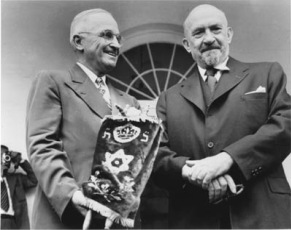
It seems not. Concerned that others might use the fact of his visit for their own suspect political ends, Truman insisted that the meeting be ‘entirely off the record; Dr. Weizmann, by my specific instructions, was to be brought in through the East Gate. There was to be no press coverage of his visit and no public announcement’. The State Department was not informed. The two men talked for ‘almost three quarters of an hour’, Truman emphasizing that his primary purpose was not to advance the Zionist cause ‘but to see justice done without bloodshed’. It was a vacuous observation, given the violent Palestine circumstances of 1948 (see section D), but Weizmann apparently conveyed what Truman described as his ‘full understanding’ of presidential priorities.
Back in August 1945 Weizmann had been profoundly sceptical as to the President’s integrity – as quoted by Benson: ‘Truman takes away with the one hand what he gives with the other, and here again I see nothing but disappointment for us. He will never jeopardise his oil concessions for the sake of the Jews, although he may need them when the time of election comes’. As he articulated it later in the decade (Trial and Error: The Autobiography of Chaim Weizmann. Book Two [1949]), American leadership on the Palestine issue ‘was weak’, his particular objection being to the U.S. arms embargo for the region ‘which seemingly placed Arab aggressors and Jewish defenders on the same footing’. As for the March 1948 meeting with Truman, there was, apparently, not a great deal to report. ‘The President was sympathetic personally, and still indicated a firm resolve to press forward with partition [as proposed by the U.N. the previous November]. I doubt, however, whether he was himself aware of the extent to which his own policy and purpose had been balked by subordinates in the State Department’. And on the very next day, the U.S. ambassador to the U.N., Warren Austin, was instructed by the Department to announce the reversal of American policy on partition, call for a suspension of hostilities in Palestine, and ask that a special session of the General Assembly be called to approve a U.N. trusteeship for the territory (film of announcement on youtube.com).
This sudden change of direction was effected without the President being formally consulted. Arguably, it was an absolutely decisive moment, revealing to Truman the impossibility of reaching any sort of reasonable accommodation with State. David McCullough, Truman [1993], records him writing furiously on his calendar: ‘This morning I find that the State Dept. has reversed my Palestine policy. The first I know about it is what I see in the papers. Isn’t that hell? I’m now in the position of a liar and a double-crosser….There are people on the 3rd and 4th levels of the State Dept. who have always wanted to cut my throat. They are succeeding in doing it.’ As for Weizmann, to whom he had just given assurances, ‘he must think I’m a shit-ass’.
‘In spite of all the forewarnings’, Weizmann later recalled, ‘the blow was sudden, bitter and, on the surface, fatal to our long nurtured hopes’. On 9 April he registered his acute dismay to Truman, stressing that the ‘choice for our people, Mr. President, is between statehood and extermination. History and providence have placed this issue in your hands, and I am confident that you will yet decide it in the spirit of the moral law’. In the end, of course, Truman obliged – but there is no evidence that Weizmann’s interventions had any significant effect on his decision to go ahead with recognition. The insubordination of State – in pursuit of what George Marshall termed ‘the wisest course’ of trusteeship – was probably the more decisive factor in his wheeling away from the Department and its anti-Zionism. Truman, always respectful to the general, blamed the lower levels at State, not the secretary himself. It had been the work of ‘the striped pants conspirators’.
B. ELECTORAL CALCULATIONS
Party-political considerations in advance of the November 1948 presidential election appear not to have produced any significant reappraisals on Truman’s part. In a demographic survey of American states in 1937, the six largest concentrations of Jewish communities were shown to be in New York, 2.21 million; Pennsylvania, 0.43; Illinois, 0.39; New Jersey, 0.27; Massachusetts 0.26; and Ohio 0.18. Roosevelt, who had given little encouragement to the Zionists, carried all six states by an aggregate plurality of 10.93 to 10.22 million in 1944. Truman, however, less than six months after his recognition of Israel, trailed Thomas E. Dewey 10.03 to 10.04 million – winning three of the states (Massachusetts by 4.88%, Illinois 0.99%, Ohio, 0.24%) and losing the other three, most notably New York. Ernest Bevin, the British foreign secretary, surmised that it was concern over his electoral strength in the state that had motivated Truman’s earlier call for the admittance of 100,000 Jews into Palestine (see section C).
Given the narrowness of the margins, and the looseness of the lumpish correlations, there is not a great deal to be concluded here – save, perhaps, that there was no evident flood of votes towards the Democrats following Truman’s recognition of Israel. This owes something, one may assume, to the fact that Dewey was himself a declared Zionist – being ‘for the re-constitution of Palestine as a free and democratic Jewish Commonwealth in accordance with the Balfour Declaration’. And Henry Wallace, Truman’s predecessor as vice-president and another keen Zionist, standing as an independent, had taken around half-a-million votes from the President in New York, costing him the state as he judged it.
James Forestall, Truman’s defense secretary, was alarmed at the possibility that any presidential enthusiasm for Zionism might prejudice the country’s security interests, and advised that the issue ought at the very least be depoliticised. He was, according to his biographer Arnold A. Rogow, ’emotionally involved’ in the issue to an unusual degree. (Victim of Duty. A Study of James Forrestal [1966].) When Robert E. Hannegan, the postmaster- general, observed in 1949, by Forestall’s recollection, that government policy, if pro-Zionist, ‘would have a very great influence and great effect on the raising of funds for the Democratic National Committee’ (of which he had been chairman between 1944 and 1947) and that ‘very large sums were obtained a year ago from Jewish contributors’, the secretary replied that when it came to votes Truman’s sympathetic remarks of the previous year as prompted by Zionist leaders ‘did not have the expected effect in the New York [1946 Congressional] election’ – serving instead ‘to make the British exceedingly angry’. It was inappropriate that Jewish contributions to party funds should be made ‘with a distinct idea on the part of the givers that they will have an opportunity to express their views and have them seriously considered on such questions as the present Palestine question’ – that issue being ‘one of the most important in our American foreign policy’,
Forestall, by his own account, later ‘buttonholed’ Hannegan’s successor as party chairman, Senator J. Howard McGrath of Rhode Island, insisting that ‘no group in this country should be permitted to influence our policy to the point of where it could endanger our national security’. Arab oil was his particular concern, and others in the Truman administration, such as Loy W. Henderson, director of the Office of Near Eastern Affairs at State, were worried that the Marshall Plan for the economic recovery of Europe was at serious risk should there be some cut-off in oil supplies from the Middle East. McGrath remarked that there were, in the U.S., two or three ‘pivotal states’ where the interest in Palestine was intense, Forestall replying: ‘I would rather lose those states in a national election than run the risks that I felt might develop in our handling of that Palestine question’. The American government should not ‘add to the already serious alienation of Arab good will’. (All these intense, repeated warnings over Zionism, however, do seem to have caused Truman much irritation, Forrestal relieved of office in March 1949 – and committing suicide two months later.)
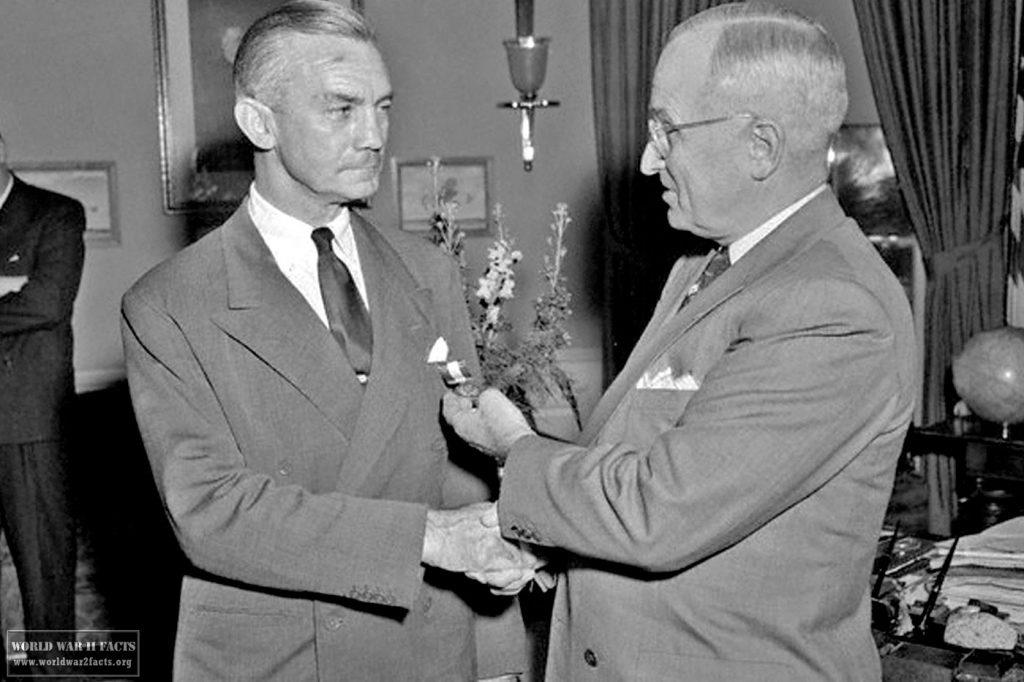
Such cautions, of course, were in wide circulation in the State Department as well as in Defense, and may have contributed to the President’s sense, like Forrestal’s, that Palestine ought to be taken out of electoral politics. In his memoirs, he cites a speech made to a large crowd in Madison Square Gardens in New York just a few days before the 1948 vote: ‘”The subject of Israel”, I said, “must not be resolved as a matter of politics in a political campaign. I have refused consistently to play policy with that question”’. This must carry some measure of honesty since delivered in the most heavily Jewish city in the Union. If Truman is to be believed, therefore – and if the bald electoral statistics as presented above have any significance – electoral manoeuvres do not seem, contrary to Ernest Bevin’s assumption, to offer any clear explanation of Truman’s late conversion to the Zionist project. According to Dennis Ross (op. cit), Dean Acheson, under secretary at State between 1945 and 1947, viewed the President as alert to ‘the extreme intensity of feeling in centers of Jewish population in this country’ but thought it quite wrong to accuse him of general ‘domestic political opportunism’ when it came to critical decision-making. Clark Clifford, Truman’s White House counsel, later recounted: ‘The charge that domestic politics determined our policy in Palestine angered President Truman for the rest of his life’. (Clark Clifford with Richard Holbrooke, Counsel to the President. A Memoir [1991].)
C. COMMISSIONS AND REPORTS
As for numbers of official Palestine enquiries in both America and Britain and various proceedings and resolutions at the United Nations, a bewildering range of debates and proposals present themselves for inspection, and it is difficult to assess precisely their influence on policy-makers in Washington and London. The general point can be made at the outset, however, that none of them came up with realistic suggestions for a practical settlement of the issues, ethnic and territorial. Sumner Welles, a former under-secretary of state under Roosevelt, wrote in 1947 (Where Are We Heading?): ‘Commissions of investigation in Palestine have been legion since the mandate commenced. Their reports have been sterile’. This, combined with the impending end of British rule in May 1948 and the intensifying military conflict between Arabs and Jews (see section D), created a rush to resolution on the part of the Zionists and their armed cohorts prevailing on the ground in Palestine, and an accompanying confrontation with Middle East realities at the White House. A power vacuum seemed likely to be opened up, which the Soviets among others might be tempted to exploit. But it was all dramatically last-minute at the Washington end.
Official British reports into Palestine issues in the 1920s and 1930s were numerous and pained, most of them generated by greater and lesser crises in the Levantine polity. The White Paper of 1939 – a statement of British policy that prevailed, with minor inflections, through to the end of the Mandate in mid-May 1948 – had, as its most controversial element, the proposal that Jewish immigration into Palestine be limited to 75,000 over a five-year period (10,000 annually plus 25,000 refugees), with no further numbers unless Arab leaders agreed, and, as practised, with deductions pro rata for estimates of illegal immigration. Additionally, the government had declared ‘unequivocally that it is not part of their policy that Palestine should become a Jewish state’. (‘British White Paper of 1939’: avalon.law.yale.edu/20th_century/brwh1939.asp.) This, predictably, caused much grief to American Zionists, and to their supporters in Congress – including Harry Truman, as cited earlier – but not particularly to the Roosevelt administration. During Roosevelt’s ‘first three terms’, writes Frank E. Manual (The Realities of American–Palestine Relations [1949]), ‘the State Department adhered strictly to the basic position…that the Jewish National Home provisions of the mandate, were not an “American interest”’, officials resenting ‘what they considered the unwarranted intervention of American Zionists in the conduct of foreign policy’.
With Truman’s accession in April 1945, however, official interest in Palestine became markedly more pronounced, initially taking the form of the inquiry into the conditions of displaced persons in European camps under the aegis of the academic lawyer Earl G. Harrison, whose report of July 1945, as already cited, made the recommendation that 100,000 Jews be admitted into Palestine as a matter of urgency, and that restrictions on land transfers to Jews be lifted. Considering the acute security problems the United Kingdom was encountering there with the growth of illegal immigration and intensifying underground activity it was a bold proposal – guaranteed to upset the British who were still trying to operate their tight restrictions. Bad relations between the two countries on the issue persisted thereafter, seriously damaging any prospect of successful collaborative effort to resolve the dilemmas. Robert R. Nathan, in the 1946 Palestine study referenced above, wrote starkly of ‘a great moral divide’ between the U.S. and the U.K. as the latter, even when aware of ‘the mass-extermination policy in Nazi Europe…were not prepared to make Palestine a refuge from death’.
Ernest Bevin, with the anxious perspectives of the Foreign Office, complained in the House of Commons that Britain as the mandatory power should have been consulted in advance of the report. ‘But instead of that, a person named Earl Harrison, went out to their [U.S.] zone in Germany, collecting certain information, and a report was issued. I must say it really destroyed the basis of good feeling that we – the Colonial Secretary [Arthur Creech Jones] and I – were endeavouring to produce in the Arab States, and it set the whole thing back’. Clement Attlee was no less aggrieved, complaining to Truman that the proposed new policy, ‘could not fail to do grievous harm to relations between our two countries’, the position in the Middle East generally being already one of ‘great danger and difficulty’. Any foolish moves could ‘precipitate a grave crisis that would be a lamentable start to the work of reconstruction to which we are now devoting ourselves’. (John Bew, Citizen Clem: A Biography of Attlee [2016]).
Seeing, however, that there was a strong case for involving the United States in the Palestine question, now that the balance of power between the Allies had radically changed post-war, with Truman seemingly keen to involve himself in Middle East affairs, the Attlee government, pressed by Bevin, suggested that there be a joint Anglo-American Commission of Inquiry to look into the issues of Jewish immigration and settlement in Palestine and the well-being of the resident population there – an exercise described in lively detail by one of the British members of the Commission, the Labour M.P. Richard Crossman (Palestine Mission. A Personal Record [1946]), and, from a contrasting American angle, by Bartley C. Crum, a past Republican supporter of Roosevelt (Behind the Silken Curtain. A Personal Account of Anglo-American Diplomacy in Palestine and the Middle East [1947]). Beginning work in Washington in January 1946, and travelling extensively in Europe – Britain, France, Germany, Poland, Czechoslovakia, Austria, Switzerland, Italy, and Greece; and in the Middle East – Palestine, Egypt, Syria, Jordan, Lebanon, Iraq, and Saudi Arabia (itinerary and dates as set out in Report of the Anglo-American Committee of Enquiry regarding the problems of European Jewry and Palestine [1946]) – the group was able to produce its findings the following April, in which the 100,000 figure from Harrison’s 1945 report was repeated, along with the recommendation that the Mandate be continued for the time being.
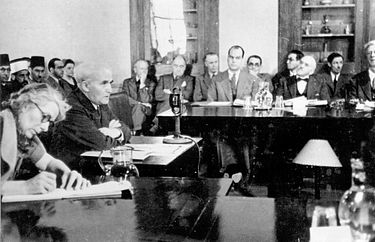
The Americans had largely called the shots, to the marked dismay of the British: ‘unanimity was preserved’, writes Amikam Nachmani, ‘by British capitulation to U.S. demands.’ (Great Power Discord in Palestine: The Anglo-American Commission of Inquiry into the Problems of European Jewry and Palestine 1945-46 [2005].) Bartley Crum supplies a telling perspective: ‘I get a definite impression that my British colleagues in their relations towards the Americans on the committee are the representatives of an old actor who feels that his time on the stage is limited and is trying his best to caution the young understudy who is to take his place’. Drollery apart, Crum also revealed the stark gulf between the two groups when he proposed, in the conclusion to his book, that the British, still adhering to their controversial 1939 White Paper, ‘should be brought before the new Permanent Court of International Justice under Article XCXVI of the mandate for calculated and deliberate violation of her trust’. The general sense was that the British were favouring the Arabs and gradually abandoning Balfour. Robert R. Nathan (op. cit.) wrote at the time: ‘The history of the successive modifications of the policy enumerated in the Balfour Declaration is, in detail, an undignified narrative of Arab violence and British retreat’.
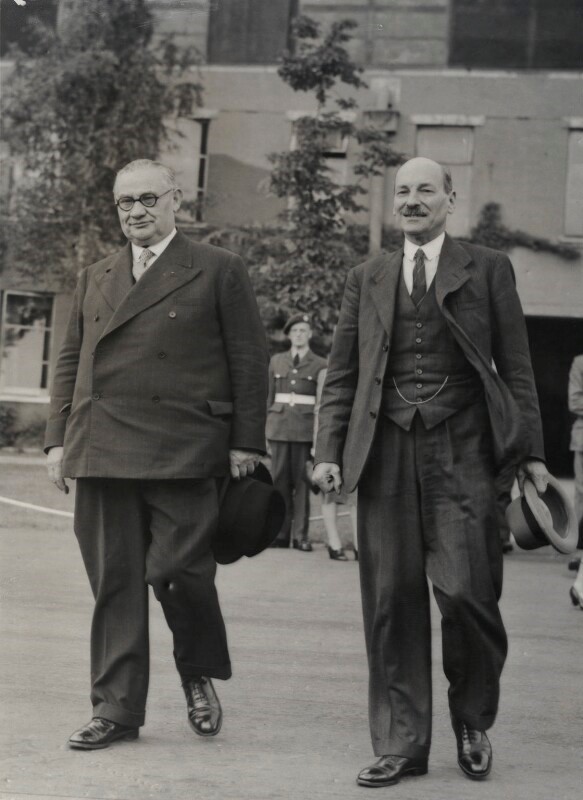
The Attlee government rejected the findings in some anger, holding that they had been badly let down by the Commission’s procedures and priorities. Ernest Bevin’s friend and biographer Francis Williams, observing that the report had been issued without ‘even a courtesy consultation with Britain’, described the foreign secretary as falling into ‘one of the blackest rages I ever saw him in’. America had acted with ‘unparalled irresponsibility in a period of acute tension when British soldiers were being killed by illegal Jewish terrorist forces’. (Ernest Bevin. Portrait of a Great Englishman [1952].) Tussles behind the scenes between Washington and London over the Commission’s workings and terms of reference had betrayed, additional to Crum’s and Bevin’s sentiments, much crippling ill-feeling between the two governments right from the outset – intrinsic, by and large, to the differing interests and comparative post-war clout of the two powers, as well as to the relative ignorance of Levantine issues on the part of the Americans (the conservative commentator Andrew Alexander observing with a more global perspective that ‘American incomprehension of the outside world, combined with a determination to lead it, has been the principal problem in international affairs since the end of the Second World War’ (America and the Imperialism of Ignorance. US Foreign Policy Since 1945 [2011]). Whatever the balance of competence and understanding, the mutual animosity afflicting Washington and London formed a pitiful basis for any common action to secure a settlement in Palestine. Even the two judges leading the American and British parts of the Commission, Joseph Hutcheson and Sir John Singleton, were at daggers drawn for much of the time: they ‘could hardly bear each other’, comments Amikam Nachmani.
Three months later, and still trying to plot a joint way forward, the so-called Morrison-Grady plan was presented by the Attlee government to the British parliament – the work of Herbert Morrison, the deputy prime minister, and Henry F. Grady, the American ambassador in London. They suggested a form of partition with Arabs and Jews running their own separate provinces, but under British oversight, and with Jerusalem and the Negev in the south remaining under direct British control. With Zionists opposed to the scheme, Harry Truman – who had initially registered approval – rejected it. The 22nd World Zionist Congress, meeting in Basle in December, described it as ‘a travesty of Britain’s obligations’. London’s performance generally over these years was critically reviewed by the Reuters correspondent John Kimche in his Seven Fallen Pillars (1950), one of his charges being that Labour politicians had shown disturbing inconsistencies in their political preferences: ‘Just as they had listened so often before to the Zionist propagandists’ version of the Middle East, and had seen no impossible difficulty coming from the Arab side, so now they were overwhelmed with secret and confidential information from their departments, which over-stated and over-emphasised the cohesion, the military strength and the political importance of the Arab states’. Bevin, he considered, had been prejudiced against the Zionists from the start because of the trouble he had encountered in his previous role as general secretary of the Transport and General Workers’ Union from ‘a handful of Communists who happened to be Jews, or Jews who happened to be Communists’.
In yet another effort to see if any sort of progress remained possible, the British now called a conference in London between themselves, the United States, and the contending local forces in Palestine – but the Americans and the Jews refused to attend, and the Arabs insisted that any future state be unitary, with democratic powers distributed strictly by demographic weight and just 4,000 Jews allowed into Palestine over a two-year period. Nothing was achieved, and nothing looked remotely like being achieved. Despairing of the possibility of any resolution being secured between the interested parties, with bad blood still infecting relations between Britain and the U.S., Attlee and Bevin, still the mandatories, decided wearily, in February 1947, that the time had now come to pass the whole issue over to the United Nations, with the request that the General Assembly try to work out new terms for a settlement. Kimche detects dishonour in the shift: ‘the British Government, with that annoying air of impartial judiciousness which so frequently irritates the foreigner’ was proposing ‘to dump this troublesome case into the Assembly’s lap and refuse to have anything further to do with it, or in any way assist the United Nations in whatever solution it might propose’.
Accordingly, on 15 May 1947, three months after the London collapse (and exactly a year before the end of the Mandate), the United Nations Special Committee on Palestine (UNSCOP) was set up. Some months later, on 3 September, the Committee produced majority and minority reports – the former being accepted by the General Assembly as Resolution 181 on 29 November, and reviving the idea of partition, with the two parts joined in an overall economic union. This was accepted by both the U.K. and the U.S. on 11 October – the U.S. indeed having strong-armed various delegations into support for the majority report. But not, consistent with their usual maximalist demands, by the Arabs. Truman, acutely concerned over the persistent existential rift, suggested to his past secretary of the treasury, Henry Morgenthau Jr., that he remind his Jewish friends that the ‘vote in the U.N. is only the beginning and the Jews must now display tolerance and consideration for the other people of Palestine with whom they will necessarily have to be neighbours’. (Raymond H. Geselbracht, ‘The United States and the Recognition of Israel: A Chronology’ [www.trumanlibary.org/Israel/Palestine.htm].)
While all this was taking place in the distant councils of London and New York, realities on the ground in Palestine – most particularly an extending and bloody civil war between Arabs and Jews – were making nonsense of the portentous debates, plans, reports, and votes. The new hope for the future, the United Nations, had no physical means at its disposal, or international agreement thereto, to impose any settlement. Bearing in mind the opposition of Palestinian Arabs, and of neighbouring Arab states, to any sort of partition, and the damage that any injudicious step might inflict on the U.S. by some interruption of oil supplies, the administration – led forcibly by the State Department, with the President initially in the dark (as discussed earlier) – completely abandoned its support for the UNSCOP plan, presenting instead, 25 March 1948, the ‘United States Proposal for a Temporary United Nations Trusteeship for Palestine’, this coming about, it was officially explained, ‘only after we had exhausted every effort to carry out partition by peaceful means. Trusteeship is not proposed as a substitute for the partition plan but as an effort to fill the vacuum soon to be created by the termination of the Mandate on May 15 (May 4 in Washington). The trusteeship does not prejudice the character of the final political settlement’. With less than two months to go, the United States was jettisoning a policy only recently approved by the Zionists and vigorously pushed by Washington, prioritising instead a scheme reflecting its deep concerns over Arab opposition to partition. It was, unsurprisingly, received as a serious affront by the Jews. ‘The overwhelming sentiment expressed in the correspondence directed at the president’, writes John Snetzinger (Truman, the Jewish Vote, and the Creation of Israel [1974]), ‘was extremely hostile to the new Palestine policy. During the spring of 1948, the telegrams received at the White House …opposed the new policy by a margin of twenty-two to one’. Arthur G. Klein, a Democrat representative from New York, called it ‘the most terrible sellout of the common people since Munich’.
Inevitably, this compounded long-standing Jewish disenchantment over Truman’s commitment to the Zionist cause. ‘By August 1946’, writes Snetzinger, ‘the president’s Palestine policy could be considered a complete failure….Within the Jewish community Truman’s reputation had declined precipitously’. A rally in Madison Square Gardens, New York, summoned in April 1948 ‘to protest the trusteeship plan, attracted over one hundred thousand sympathisers’, police authorities reckoning that it constituted the largest crowd ever to have assembled in the venue. Some days later a further thirty thousand turned up at Yankee Stadium. The end of the Mandate was less than six weeks away.
D. EVENTS ON THE GROUND
What happened over these remaining few weeks to transcend the schemes in London, Washington, and New York, and to relieve Truman of such mass Jewish hostility? An absolutely critical factor was the continuance of the Arab-Jewish civil war and its effects on presidential thinking. The intensifying conflict resulted from attempts at territorial positioning in advance of any implementation of the U.N. plan. As the UNSCOP report observed, ‘present indications point to the inescapable conclusion that when the mandate is terminated, Palestine is likely to suffer severely from administrative chaos and widespread strife and bloodshed’ (Geselbracht, op. cit.). Events were moving with great rapidity, and it was becoming clear that the Jews were gaining significant ground over the Arabs, this generating a powerful realpolitik momentum of events that carried the whole issue forward to an imminent assertion of Israeli statehood. Truman, it seems, chose to be on the winning side of history as he judged it – abandoning with some alacrity the new trusteeship proposal of late March.
Given events on the ground, no-one could visualise any possibility of Arabs and Jews settling their differences under externally conceived plans. Massacres in particular ensured that the contending communities would retreat, decisively, terminally, and emotionally battered, into their respective laagers – where indeed they had resided over the preceding two decades following the murderous riots of 1929 (see my earlier post, ‘The 1929 Palestine Riots: A Conflicted Jewish Historiography’, balfourproject.org, 21 July 2017), with the 1936-39 Arab Revolt further consolidating the separation, an estimated 5,032 Arabs and 415 Jews being killed in the course of the hostilities.
Vicious inter-communal conflict intensified as the different groups, and in particular the Jews, sought territorial advances in the last weeks of the Mandate. Avi Shlaim and Ilan Pappé label the relevant sub-sections of their books ‘The Unofficial War’ and ‘The Ethnic Cleansing of Palestine (March-May 1948)’ respectively. (The Iron Wall. Israel and the Arab World [2014 edn.] and A History of Modern Palestine [2006 edn.].) Shlaim writes how, following Arab guerrilla attacks in late 1947-early 1948, ‘commanders of the Haganah [paramilitary organization founded 1920] …advocated hard-hitting military reprisals. Ben-Gurion [de facto leader of the Jewish community, soon to be Israel’s first prime minister] himself shared the latter’s opinion that their best bet under the circumstances was not to contain and localize the trouble but to escalate the military conflict. Consequently, the Haganah embarked on a policy of “aggressive defense”….Plan D, prepared by the Haganah chiefs in early March, was a major landmark in the development of this offensive strategy’, its aim being ‘to secure all the areas allocated to the Jewish state under the UN partition resolution as well as Jewish settlements outside these areas and corridors leading to them, so as to provide a solid and continuous basis for Jewish sovereignty’. Their success ‘reinforced the conviction that military force offered the only solution to the Arab problem’.
Pappé suggests that the Jews were prompted by anxiety over ‘the feebleness of the UN’s commitment to the creation of a Jewish state in Palestine’. It was essential to drive the issue forward by the intensification of military action. The main objective of Plan D, he indicates, ‘was to cleanse the future Jewish state of as many Palestinians as possible….Each [Haganah] brigade received a list of villages it was to occupy. Most of the villages were destined to be destroyed….By the time the British left in the middle of May, one-third of the Palestinian population had already been evicted’,
Particular events (‘1948 in Mandatory Palestine. Events in the year 1948 in the British Mandate of Palestine’ [wikipedia.org./wiki/1948_in_Mandatory_Palestine]) further damaged any remote prospect of inter-communal accommodation. 9 April witnessed a massacre in which around 120 fighters from the Irgun and Lehi paramilitary units, offshoots of Haganah, attacked the village of Deir Yassin near Jerusalem, killing, by Jon Kimche’s (op. cit.) reckoning, ‘250 innocent Arabs among them more than a hundred women and children’, and later parading a number of prisoners through the streets of Jerusalem. Kimche called it ‘the darkest stain on the Jewish record throughout all the fighting’, and noted how it was justified at the time by a ‘panic flight of the remaining Arabs in the Jewish state area’ and the likely lessening of future casualty rates among Jews. On the 13th, a Jewish medical convoy, escorted by Haganah militia, carrying medical and military supplies and personnel to the Hadassah hospital on Mount Scopus, was ambushed by Arab units, killing 79 – largely doctors, nurses, and patients – the Jewish Agency demanding that action be taken against a breach of the Geneva Convention.
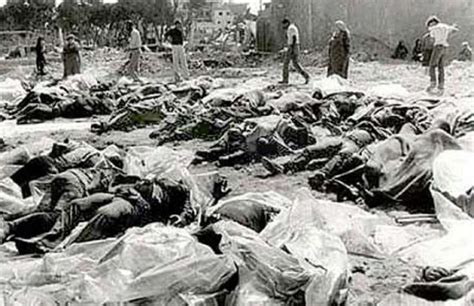
On 15 April Haganah and its Palmach strike force, in Operation Yiftach, captured Safed and other Arab villages to secure eastern Galilee, executing 70 men and blowing up or setting fire to the local houses. A week later Haganah seized Haifa and the settlements inland from Jaffa, before taking Jaffa itself on 13 May – this known as Operation Bi’ur Hametz, whereby most of the villages over a wide area were systematically levelled. According to Kimche, the bombardment of the city ‘started a panic among the Jaffa Arabs’, some 20,000 leaving by boat and road. ‘
Between 22 April and 2 May further inroads into Jerusalem, following the Deir Yassin massacre, were achieved under Operation Yevusi, in which 40 Arabs were killed in the first few days. By the end of the attack, 12 of the city’s 15 Arab quarters were in Jewish hands, with the resultant exodus of around 30,000 people. On 11 May, in Operation Gideon, Haganah captured Beit She’an and its surrounding neighbourhood, expelling possibly as many as 1,500 residents to Jordan. Two days before the end of the Mandate there occurred the Kfar Etzion massacre: an Arab assault on a number of new kibbutzim on the road between Jerusalem and Hebron, leading to the deaths of 129 Haganah fighters and a number of settlers, of whom 15 had already surrendered. In the course of Operation Ben-Ami, 13-14 May, the Jews took Acre and most of the coast up to the Lebanese border – under instructions from their commander, Moshe Carmel, to ‘attack in order to conquer, to kill always the men, to destroy and burn the villages’.
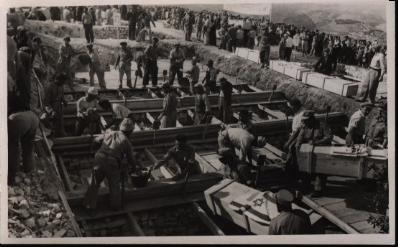
A horrific momentum, both Arab and Jewish, but with decisive advantage to the latter, had therefore been generated in the very last days of the Mandate, creating new psychic and territorial realities that overrode all the diplomatic manoeuvrings a quarter-world away in New York and Washington. As the White House adviser David Niles put it in a memo of 6 May, ‘events in Palestine have outstripped our efforts for a peaceful solution’. (Snetsinger, op. cit.) Recognition of the Zionist state when it came, was, Dennis Ross (op. cit.) suggests, a matter of ‘accepting what was already a fact’. For Harry Truman, it was now a question of riding events as best he could.
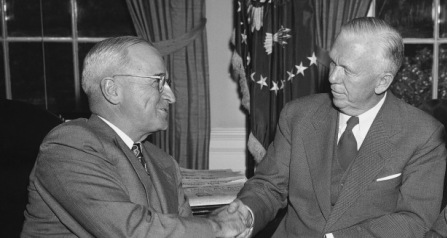
There was, however, one particularly daunting task for the President to perform: that of confronting his anti-Zionist secretary of state, George Marshall – either to persuade him finally of the case for recognition or, daringly, to find some way of marginalising the individual whom he regarded as the grandest embellishment of his administration. In the judgement of John Snetsinger. it was only in the last hours between that encounter, 12 May, and the end of the Mandate, 14 May, that the President finally and decisively made up his mind to proceed with recognition.
…………………………….He had been carried to that point by the various factors suggested at the outset – but these with differing potency. The first two, lobbying pressures and electoral manoeuvres, can be discounted as major considerations, though, given the noise emitting from both, they must have weighed to some limited measure in the President’s calculations. As for the enquiries, reports, and multinational proceedings at the United Nations, the failure of all of these to provide an agreed settlement for the Arab and Jewish communities in Palestine demonstrated to Washington that final resolution was impossible by diplomatic means. The profound ill-feeing already corrupting Arab-Jewish relations was compounded by a paralysing lack of good faith and mutual understanding between the main external parties, the U.S. and the U.K.. Similar damaging tensions prevailed within the much tighter confines of the American administration itself, most problematically between the White House and the State Department, Truman being much angered by the arrogance of the ‘pin-striped boys’ and the Department’s willingness to act in defiance of presidential policy. Asserting the authority of his office in itself generated a momentum towards recognition.
The most decisive and compelling influence of all, however, appears to have been Jewish military initiative and success in Palestine, much accelerated in the weeks immediately preceding the expiry of the Mandate. Autonomous forces in the field were, so to speak, taking charge of their own history. As the U.S. trusteeship proposers declared on March 25, ‘we had exhausted every effort to carry out partition by peaceful means’. The Jews could now carry out their own version of that partition by violent means. Truman, in the end, could only behold this, impotently; and worry about the international implications of a sudden power vacuum consequent upon the ending of the Mandate. He was not, as the above account shows, any sort of ideologue on the issues. ‘My policy with regard to Palestine’, he recounted in his memoirs, ‘…was dedication to the twin ideal of international obligations and the relieving of human misery’. He had, writes Snetsinger, ‘no commitment to the Zionist program….With all its contradictions and vacillations, Truman’s Palestine-Israel policy offers an extraordinary example of foreign policy conducted in line with short-range political expediency rather than long-range national goals’.
The major and final calculation of political expediency was the understanding that he could not possibly end up in public dispute with his secretary of state George Marshall. That, it was recognised by his advisers, could be the undoing of his administration. A private encounter, with only a few aides present, had to take place. As Clark Clifford, a key participant later observed, resolving the matter turned out to be ‘a near-run thing’.
11
